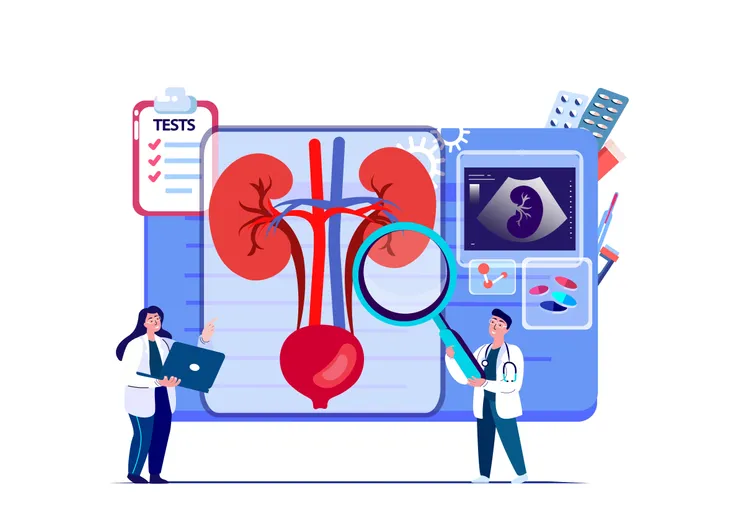- A metallic taste in the mouth might be a sign to improve your oral hygiene but it can also be a warning sign of a more serious condition.
- Some serious conditions that may cause a metallic taste in the mouth include kidney failure, chemical exposure, and certain syndromes.
- Since it can be a sign of an underlying condition, you should make an appointment if the metal taste doesn’t have an obvious trigger and doesn’t go away.
Have you ever had a taste in your mouth that suggests you’ve been sucking on a metal spoon? Well, perhaps you have been if what’s on the spoon was delicious. But more often than not, you can taste metal without any actual metal being involved.
While this metallic taste on your tongue might be a sign you need to step up your oral hygiene game, it can also be a warning sign of more serious conditions. Let’s investigate further to uncover what might be causing that unwelcome flavor…
Poor Oral Health
You know you should brush and floss regularly. But many do not, and end up with a host of oral issues including gum disease (gingivitis or the more serious, periodontitis). A telltale sign of this problem is sensitive and bleeding gums. A related metallic taste is also a sign you need to brush up on brushing, says Medical News Today.
If you’re noticing inflammation and bleeding, you should be seeing a dentist to address any infections in your mouth and to ensure your teeth are in optimal shape. There are several ways to prevent gingivitis, from getting enough vitamin C to brushing with baking soda.
 hedgehog94 / Shutterstock
hedgehog94 / ShutterstockSinus Issues
Did you know that your sense of smell plays a role in your ability to taste? With that in mind, it’s no wonder that having sinus problems that affect your sense of smell can also throw off the flavors in your mouth.
Healthline says sinus problems are a “common” cause of a metallic tinge on the tongue, due to colds, allergies, and sinus infections that can also cause headaches and fever. In this case, it’s called sinusitis, says WebMD. The source notes treatments include saline rinses, decongestants, or in some cases, antibiotics from a doctor.
Certain Medications
Medical News Today reports, “Some medications can cause an aftertaste as the body absorbs them.” And that aftertaste can be somewhat metallic. For example, it says that diabetic patients who use Metformin as a treatment have reported a metallic flavor in their mouths, as it ends up in the saliva.
The source says chemotherapy drugs can cause this issue, as well as some antibiotics, thyroid medications, lithium, as well as gallium nitrate used to control calcium levels. It adds that anticholinergics used to treat urinary incontinence and chronic obstructive pulmonary disease (COPD) can cause a dry mouth, which can also cause a metallic flavoring.
Vitamin Supplements
Other pills can cause a strange taste in your mouth that resembles metal. Cleveland Clinic explains that vitamins can sometimes trigger a metallic taste in the mouth, especially in those with heavy metal content, such as copper and zinc.
The source explains that the metal flavor will diminish as your body absorbs the vitamin supplements (which include zinc lozenges meant to soothe colds). “If not, check your dosage and make sure you’re not taking too much,” recommends the source. As a guideline, you only need about 8 to 11-mg of zinc per day but be sure to check with your doctor.
Central Nervous System (CNS) and Neurological Disorders
Healthline says certain disorders that affect the central nervous system can “distort” taste signals to your brain, which apparently can cause foods to taste metallic instead. It notes that a stroke or Bell’s Palsy can be examples of conditions/injuries that result in the metallic taste.
Meanwhile, Cleveland Clinic says dementia (a possible symptom of a neurodegenerative disorder) can cause flavors not to register as per usual. Taste buds are linked to your brain, and “taste abnormalities” can result when the part of your brain that processes taste is malfunctioning, notes the source.
Pregnancy
If you didn’t know you were pregnant, that strange metal taste in your mouth could be trying to tell you something. WebMD says that being pregnant can shift your sense of taste, and in this case, make you believe you’ve chewed on iron.
The source says this strange side effect of pregnancy is usually present during the earliest stage, but it “should be temporary and go away on its own.” Meanwhile, if you suspect you’re pregnant (or the metallic taste remains), it might be a good idea to contact your physician.
Kidney Failure
This metallic taste could be the result of kidney issues, explains Medical News Today. In fact, the source says it’s often related to “end-stage kidney disease,” which is the last step in the disease’s progression. That can mean the need for dialysis or a kidney transplant.
The reason why kidney problems and metallic tastes go together is due to the “high levels of urea” and other unwanted substances in the body, as well as low levels of zinc, says the source. Patients may also get this particular side effect from related medications, or experience a “change in the flow and composition of saliva.”
Chemical Exposure
Cleveland Clinic says that inhaling certain chemicals can trigger a metallic taste in your mouth. The source explains that insecticides are among the culprits, and they can be a result of “pesticide poisoning.” It also says that ingesting lead and mercury, both chemical elements, can also lead to a weird lingering flavor.
The source explains that lead can be inhaled from flaking lead-based paints (and can also be found in some cosmetics and water sources), while toxic mercury is sometimes found in fish and other seafood. The source says if you suspect you’ve been exposed to these chemicals, you should see a doctor as soon as possible.
Allergies
The same source says that allergies could be to blame for that lingering metal flavor on your taste buds. It notes the strange taste can be a side effect of potentially fatal allergic reactions to shellfish or tree nuts. “It’s an early sign of anaphylaxis,” which can be fatal.
If you know you have an allergy, or even if you just suspect you do, then you should talk to a doctor about what you should do in the case of accidental ingestion, such as using an EpiPen.
Cancer Treatments
Healthline explains that a metallic taste can be a side effect of some cancer treatments. It says some forms of chemotherapy, as well as radiation, can cause something called “chemo mouth” that is as unpleasant as it sounds.
The source says it may be a sign of vitamin deficiencies during treatment. The good news is you may be able to counteract this side effect by taking vitamin D or zinc supplements (but remember that zinc can also cause this effect, so use it in moderation).
Certain Syndromes
Syndromes often come with a mixed bag of symptoms. Those signs may include a metallic taste in the mouth, especially in the case of Sjogren’s syndrome and Guillain-Barre syndrome, according to Medical News Today.
It notes that Sjogren’s syndrome can cause excessive dryness in the mouth and sinuses, and those with it sometimes experience the metallic flavoring. Guillain-Barre syndrome affects the peripheral nervous system and can cause temporary paralysis and ” dysgeusia” (the medical term for a taste disorder) in the early stages.
Some Other Possible Remedies
Aside from the treatments mentioned already, there are some other strategies to manage the uninvited taste in your mouth, explains WebMD. That includes brushing your teeth twice a day (and flossing), as well as drinking water, and chewing sugar-free gum to hinder infections.
The source also suggests rinsing your mouth with a 1/2-teaspoon of salt and baking soda in 1-cup of warm water before eating. And yes, it even suggests using plastic utensils (and cookware) so you don’t actually pick up flavor from that peanut butter-filled spoon you’re licking. Meanwhile, eating citrus fruits may also help mask the metallic taste.
When to See a Doctor
Medical News Today explains that a metallic taste in your mouth is usually more of an annoyance than a serious problem. However, since it can be a sign of an underlying condition, you should make an appointment if the metal taste doesn’t have an obvious trigger and doesn’t go away.
If it’s a medication issue, then a doctor can possibly switch your prescription to something more taste bud-friendly but don’t adjust the dosage or drug type on your own. They can also assess you for any other symptoms that can go along with the strange taste, which could be clues of the root cause.















